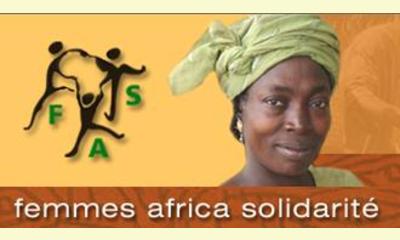|
|
The Implementation of UNSCR 1325 through Enhanced Responsiveness of the Security Sector
un articulo por Femmes Africa Solidarité
In partnership with the Geneva Centre for the Democratic Control of Armed Forces (DCAF), Femmes Africa Solidarité (FAS) organized a two-day capacity building workshop for civil society organisations and security sector institutions from the Mano River region 8-10 December, 2011 in Monrovia, Liberia. This initiative is a partnership between FAS and DCAF in the area of gender, security sector reforms and governance (SSR/G) issues in the region, and was implemented in cooperation with Angie Brooks International Centre (ABIC) and Mano River Women’s Peace Network (MARWOPNET).

click on photo to enlarge
The workshop aimed to provide civil society organisations (CSOs) and security sector personnel in the 4 countries of the Mano River region with the tools and knowledge so as to engage in the implementation of United Nations Security Council Resolution (UNSCR) 1325 as well as to contribute to the development of gender responsive peace and security processes. [editor's note: for more information on UNSCR 1325, see the CPNN discussion UN Resolution 1325, does it make a difference?. The specific objectives of the workshop are to enhance awareness of the security sector and the UNSCR 1325, identify sensible ways of integrating gender issues into SSR processes, as well as to reinforce a dialogue between civil society organisations and security sector institutions on the one hand, and between security sector actors from all Mano River Union member states on the other.
The workshop was attended by civil society representatives and security personnel from the four Mano River Union member states, i.e. Côte d’Ivoire, Guinea, Liberia and Sierra Leone1. The training was conducted by 3 representatives from DCAF, namely Anike Doherty, Gender and SSR Project Officer, Karin Grimm, Gender and Project Coordinator, as well as Eleonore Pavey, ISSAT Training Coordinator.
The expected outcomes of the workshop include a comprehensive workshop report in English and French, containing recommendations for a more effective implementation of UNSCR 1325 through enhanced gender integration into security sector reforms and governance in the Mano River region. 1 In this case, the civil society refers to community-based organisations, human rights organizations and women’s groups, who all play a key role in overseeing the security sector and its gender-responsiveness. Personnel from security sector institutions include personnel from statutory management and oversight bodies, in which the ‘core security actors’ is comprised of the armed forces (including international and regional forces), police services, gendarmeries, paramilitary forces, intelligence and security services, coast guards, border guards, customs authorities as well as local security units.
|








|
DISCUSSION
Pregunta(s) relacionada(s) al artículo :
UN Resolution 1325, does it make a difference?,
* * * * *
Comentario más reciente:
A recent study by the NGO Working Group on Women, Peace and Security is critical of the UN Security Council for its inconsistent implement of Resolution 1325 that calls for an increased role of women in peacekeeping and peacebuilding. The full report is available on the Internet on the website of womenpeacesecurity.org.
The working group members are an impressive group of active international NGOs: Amnesty International; Consortium on Gender, Security and Human Rights; Femmes Africa Solidarité; Global Action to Prevent War; Global Justice Center; Human Rights Watch; The Institute for Inclusive Security; International Action Network on Small Arms; International Alert; International Rescue Committee; Refugees International; International Women’s Program of the Open Society Foundations; Social Science Research Council; Women’s Refugee Commission; Women’s Action for New Directions; Women’s International League for Peace and Freedom.
Here is the report's Summary of Findings
General trends in the Council over the last 12 years have shown significant development, including in the language and expertise on women, peace and security in resolutions, more expertise available to deploy in terms of gender advisors and women, peace and security, and a more sophisticated understanding of the key issues at the root of this agenda. There is a better understanding of, for example, what it takes to have disarmament, demobilization, and reintegration processes that are responsive to women; security sector reform that is responsive to women; and post-conflict elections that support women candidates and women voter. However, there is inconsistency in the Council’s deployment of that knowledge. There is still a significant disconnect between the content of reports received by the Council, meetings the Council holds, and resolutions it adopts.
There have been a number of positive developments in the Council’s use of women, peace and security-specific language in its policy over the last year. For the first time, for example, the Council used women, peace and security language in its resolution on Cyprus. However, there have also been inconsistencies. The Council’s initial lack of support for women in September 2011’s resolution on Libya was rectified by strong support in its March 2012 renewal. . ... continuación.

|
|









